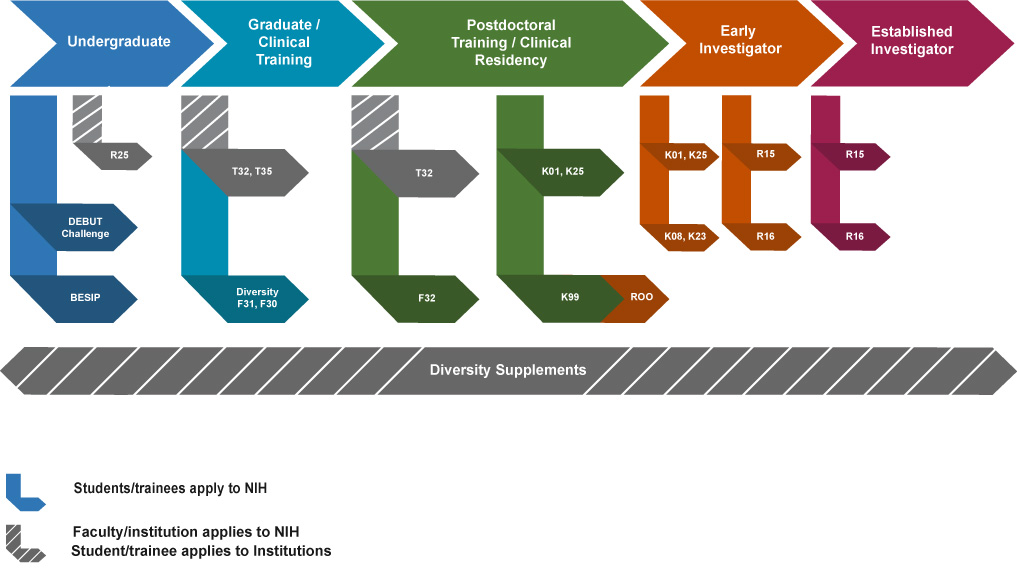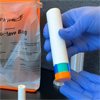This division aims to develop a competent and diverse workforce that can address bioengineering challenges of the future. The division supports research training starting with undergraduate education through the early career stage.

Program Areas

Fellowships
Support for doctoral students, postdocs, and dual degree (M.D./Ph.D.) candidates.
Grants:
Contact:
Alert - For due dates after January 25, 2025, changes are coming to the application and review of NIH fellowship applications. Learn more about these changes.
Career Development Awards
Support for late-stage postdocs and early-career investigators working toward research independence under guidance of a mentor.
Grants:
- K01
- K08
- K23
- K25
- K99/R00 Independent Clinical Trial Not Allowed (HEAL Initiative)
- K99/R00 Independent Clinical Trial Not Allowed (Diversity HEAL Initiative)
- K99/R00 Parent (NIH Pathway to Independence Award)
- K99/R00 Independent Clinical Trial Not Allowed (MOSAIC)
- K99/R00 Independent Clinical Trial Required (BRAIN Initiative)
Career Level:
Contact:
Research Enhancement Awards
Support for investigators at institutions that are not major recipients of NIH funding as they conduct research at undergraduate-focused institutions or health professional/graduate schools.
Grants:
- R15 Clinical Trail Not Allowed (AREA)
- R15 Clinical Trial Not Allowed (REAP)
Career Level:
Contact:
Support for Research Excellence
Support for research capacity building and excellence in U.S. higher education institutions that receive limited NIH funding and serve students from groups underrepresented in biomedical research.
Grants:
- R16 Clinical Trail Not Allowed (SuRE-First)
- R16 Clinical Trial Not Allowed (SuRE)
Career Level:
Contact:
Research Education Programs
Support research education activities.
Grants:
- R25 Clinical Trial Not Allowed Science Education Partnership Awards Program
- R25 Clinical Trial Not Allowed Summer Research Education Experience Program
- R25 Clinical Trial Not Allowed NIH Blueprint Program
- R25 (ESTEEMED)
- R25 Team-Based Design in Biomedical Engineering Education
Contact:
- Tina Gatlin, Ph.D. (ESTEEMED, SEPA)
- Dave Gutekunst, Ph.D. (TBD, SRE)
Training Grants
Support institutional research training opportunities for graduate student (predoctoral) and postdoctoral (including medical residency) levels in areas relevant to NIBIB's mission. PI applies to support the training of individuals at various education levels.
Grants:
Contact:
Supplements
Supplement active NIH research grants to enhance the diversity of the workforce or to support individuals with high potential to re-enter an active research career after a qualifying interruption. PI of existing grant applies to support individuals at various career levels.
Grants:
- NOT-GM-22-005 - Administrative supplements for research on women's health in the IDeA states
- NOT-OD-24-001 - Administrative supplements to recognize excellence in diversity, equity, inclusion, and accessibility (DEIA) mentorship
- NOT-OD-23-170: To Promote Re-entry,Re-integration into, and Re-training in Health-Related Research Careers
- PA-23-189: To Promote Diversity in Health-Related Research
- NOT-OD-23-031: To Promote Research Continuity and Retention of NIH Mentored Career Development (K) Award Recipients and Scholars
- NOT-OD-23-032: Continuity of Biomedical and Behavioral Research Among First-Time Recipients of NIH Research Project Grant Awards
Contact:
Support for Conferences and Scientific Meetings
Career Level:
Contact:
Loan Repayment Program
Recruit and retain qualified health professionals in biomedical research careers by counteracting financial pressure of student loans.
Grants:
Career Level:
Contact:
Collaborations
-
Design by Biomedical Undergraduate Teams (DEBUT) Challenge (NIBIB led) Three NIH partners, NIH Office of AIDS Research, the National Institute of Minority and Health Disparities, and the National Cancer Institute are providing a prize each for 1.) technologies for HIV/AIDS prevention and/or care, 2.) technologies for underrepresented populations and/or for low-resource settings, and 3.) technologies for cancer prevention, diagnosis and treatment prize. DEBUT website.
-
Special Populations Research Forum – SPRF provides a trans-NIH forum for sharing and examining programs, initiatives, and strategies aligned with the NIArtificial Intelligence for BiomedicaL ExcellenceH mission that enhance and accelerate the development of the research careers of individuals from diverse populations.. SPRF website.
-
Artificial Intelligence for Biomedical Excellence – AIBLE's purpose is to generate new biomedically relevant data sets amenable to machine learning analysis at scale and is anticipated to launch in fiscal year 2021. View Presentation.
-
Brain Research through Advancing Innovative Neurotechnologies (BRAIN) Initiative – Presidential project aimed at revolutionizing our understanding of the human brain. The goal is to map circuits of the brain, measure fluctuating patterns of electrical and chemical activity flowing within those circuits, and understand how their interplay creates our unique cognitive and behavioral capabilities. By accelerating the development and application of innovative technologies, researchers will be able to produce a dynamic picture of the brain that, for the first time, shows how individual cells and complex neural circuits interact in both time and space. It is expected that the application of these new tools and technologies will lead to new ways to treat, cure, and even prevent brain disorders. NIH is one of several federal agencies involved in this initiative. For more information see the BRAIN website.
-
Blueprint – The over-arching goal of this NIH Blueprint R25 program is to support educational activities that encourage individuals from diverse backgrounds, including those from groups underrepresented in the biomedical, behavioral, and clinical research workforce, to pursue further studies or careers in research. Blueprint website.
Division Staff
Related News
Science Highlights ·
An NIBIB-funded research education program designed to diversify the biomedical workforce inspired two participants to pursue Ph.D. research in biomedical engineering.
NIBIB in the News ·
A team of Johns Hopkins biomedical engineering undergraduates took home a $15,000 prize at the National Institutes of Health’s 2023 Design by Biomedical Undergraduate Teams (DEBUT) Challenge, which seeks innovative solutions to unmet health needs. Source: Johns Hopkins University
NIBIB in the News ·
Two teams of UC San Diego undergraduate bioengineering students won Design by Biomedical Undergraduate Teams (DEBUT) awards from the National Institutes of Health. Source: UC San Diego
Press Releases ·

The National Institutes of Health and the higher education non-profit VentureWell have selected 10 winners and five honorable mentions of the Design by Biomedical Undergraduate Teams (DEBUT) Challenge, who are set to receive prizes totaling $145,000. The awards will be presented to the winning teams during the annual Biomedical Engineering Society conference held Oct. 11-14, 2023.
NIBIB in the News ·
T cells experience different mechanical signals in different tissues. Researchers have engineered a tissue-mimicking hydrogel model to show that more elastic tissues induce T cells to become effector-like T cells with strong tumor-killing potential, while more viscous tissues induce them to become memory-like T cells. This new concept could help advance adaptive T cell therapies by producing desired patient-specific T cell populations in the dish that could provide stronger effects when infused back into the same patient. Source: Wyss Institute for Biologically Inspired Engineering at Harvard/Science Daily



